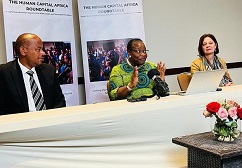By Shiferaw Tadesse – As the World Bank has recently unveiled a shocking data on foundational learning in Sub-Saharan Africa, African leaders are urged to take urgent and committed measures and cure the shocking foundational learning crisis on the continent.
The call was made during a two-day Human Capital Africa Summit wrapped up with a joint press conference by the co-organizing institutions on Tuesday in Ethiopia’s capital Addis Ababa. Speaking to the joint press conference, directors from Human Capital Africa (HCA), the Association for the Development of Education in Africa (ADEA) and UNICEF have underlined the urgency of the problem as “Agenda 2063 goes nowhere with the existing problem of foundational learning crisis” whereby nine out of ten African children are unable to read with understanding and do basic math by age 10.
Opening the two-day event, Human Capital Africa Advisor Board member and former Deputy Chair of the African Union Erastus Mwencha, who spoke on behalf of President Joyce Banda, Chair of the HCA Advisory Board, said: “It is crucial to acknowledge the gravity of the situation that lies before us. Despite our concerted efforts and progress over the years, a staggering 9 out of 10 children in Africa are unable to read and understand a simple text by the age of ten. This is not just a statistic; it represents millions of dreams deferred, countless potentials unfulfilled, and a future that is being compromised.”
AU has been urged to put foundational learning at the heart of this year’s African Union Year of Education, and tell African governments to prioritize the use of data and evidence to drive informed, cost-effective and system-wide interventions that can be implemented using existing resources.
Albert Nsengiyumva, Executive Secretary of ADEA, Dr Oby Ezekwesili, Founder/CEO of Human Capital Africa (HCA), and Lieke van de Wiel, UNICEF Deputy regional director for east and southern Africa, urged members of the press to spread the message throughout the continent with its urgency, as failure to address the problem, will in turn cause multiple misfortunes.
At the opening of the two days Human Capital Africa Summit on Monday Dr Oby Ezekwesili said: “If there is a proper evidence-based approach then the incremental cost of doing the right things at foundational levels will be negligible compared to the outcomes that it will achieve throughout the education system. The integrity of the foundation of education is something that we must embrace as a continent. Our leaders must become Chief Learning Officers to demonstrate the leadership required to overcome this challenge. This group here today is focused on ensuring that the most influential voices on our continent say that this crisis must be fixed.”
The directors stressed that failing to address the learning crisis will have catastrophic results for the continent’s education outcomes across secondary, tertiary and TVET, significantly restricting future employment opportunities. They noted that if not addressed immediately, the educational crisis will prevent the achievement of the Sustainable Development Goals in Africa leading to worse health outcomes, greater youth unemployment and deeper levels of poverty.
“We have all understood the challenge we face, we must now ensure that our concerns are shared as widely as possible and that Heads of State hear our message in the context of all the challenges facing the continent. They must consider the impact that failing to address the learning crisis will have on all of our other continental priorities. We know what is required – now we have to drive implementation systemically, not on a project basis, and at scale,” said Albert Nsengiyumva.
They also stated that failing to cure the foundational learning crisis in the continent will significantly impact the future prospects of Africa’s private sector by restricting the availability of a skilled workforce. It will prevent the achievement of the African Union’s Vision for the ‘Africa we want’ by 2063.
Over the coming days African leaders are set to hold their annual summit in Addis Ababa, Ethiopia. Education is at the center of this year’s African Union Summit.

